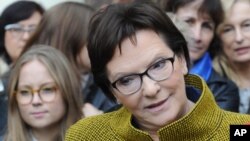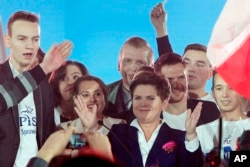Only two parties in Poland can be sure of winning substantial numbers of parliament seats in Sunday's general elections: the ruling Civic Platform party and the largest opposition party, Law and Justice, the leader in opinion polls.
A new small left-wing party, razem – which does not capitalize the word meaning “together” – became a sensation after a strong performance in a televised debate Tuesday. There several small radical right-wing parties and a coalition of left-wing parties. One or more small parties could end up as coalition partners of the winner.
An estimated 30.7 million of the nation’s 37.4 million people are eligible to vote Sunday, the State Electoral Commission says. They’ll choose 460 lawmakers and 100 senators for terms of four years.
Voters can mark only one candidate from one party, which counts as a vote for the party and for the candidate. Eight parties are competing nationwide and another seven are running among fewer constituencies.
The party that gets the most votes nationwide wins and gets a proportionate number of seats in parliament. Its lawmakers are those who received the highest number of votes on the party list. A party needs to win at least 5 percent of valid votes and a coalition at least 8 percent of valid votes to enter parliament.
Here’s a look at the two main parties:
Civic Platform party
The leading force in a coalition government with the small Polish People's Party, it has been in power since 2007. Prime Minister Ewa Kopacz took over as government and party leader last year from Donald Tusk, now president of the European Union.
Tax policy: It wants tax exemptions for those earning the least, for families with children and for employers to encourage new jobs.
Euro: It favors eventually adopting the euro, but has no set date.
Climate: It supports coal as a main source of energy and jobs. Poland repeatedly vetoed EU climate policy but eventually joined in.
Jobs: Under Civic Platform’s rule, temporary job agreements without health care or pension rights proliferated. It now vows to limit them.
Social issues: The party raised the retirement age to 67 from 60 for women and 65 for men to help the strapped pension fund. It implemented state funding for in vitro fertilization. It supports civic partnerships for gay and straight couples, but has not campaigned strongly for that.
Migrants: Civic Platform says no to economic migrants, but the government has agreed to take 7,000 refugees from Syria and Eritrea as part of an EU plan.
Religion: It wants to end state funding of religious denominations.
EU and national security: It seeks a stronger position in the EU for Poland and a greater U.S. and NATO military presence in the country.
Electorate: Support is strongest in big cities, among secular Poles and among those who have benefited from the transition to a market economy following communism's collapse 26 years ago.
Law and Justice party
The largest opposition party, it mixes Catholic values with welfare policies. It was in power from 2005 to 2007.
Tax policy: It seeks new taxes on foreign-owned banks and supermarket chains; tightening the tax collecting system, especially for value-added tax and corporate tax; lowering the personal income tax, and cash allowances to poorest families with children.
Euro currency: Poland's currency, the zloty, should be preserved.
Climate: It wants to renegotiate the EU climate policy agreement, which it says blocks the nation's development.
Jobs: It promised some 1.2 million new jobs and higher pay for young people to stop them from emigrating.
Social issues: It would reverse Civic Platform's increase of the retirement age. The party opposes state support for in vitro fertilization and opposes abortion and gay marriage.
Migrants: Under Law and Justice, Poland would not accept migrants and refugees. It says financial aid should be offered to refugees in Middle East camps.
Religion: The Catholic Church should preserve its role as a moral authority and be supported by the state.
EU and national security: EU should respect Poland's interests. The country needs more NATO and U.S. troops.
Electorate: Support is strong in the countryside, among older Poles and those who struggle on low wages or who have otherwise not prospered in the capitalist era.







